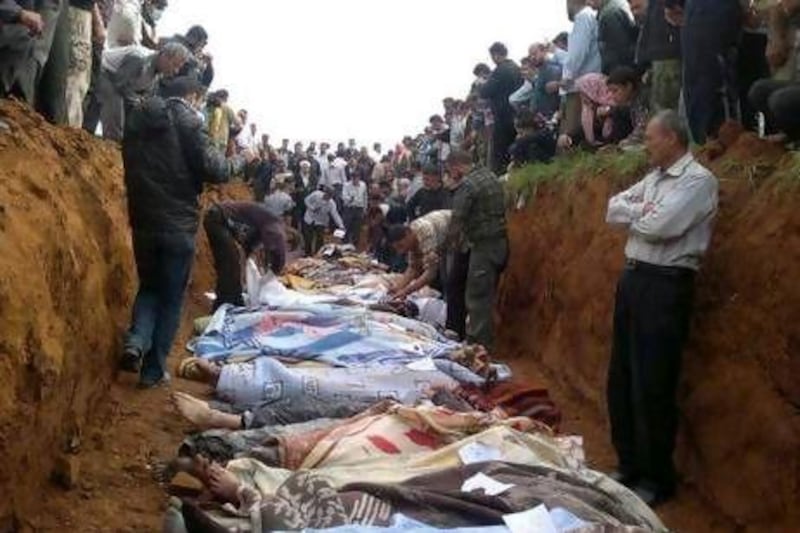DAMASCUS // With a United Nations ceasefire deadline now just days away, Syrian opposition activists reported more than two dozen people killed yesterday when soldiers, tanks and security forces pressed ahead to quash the country's year-long uprising.
More than 300 people have been killed since Tuesday, according to activists, when the Syrian authorities signed up to a peace plan headed by Kofi Annan, the UN-Arab League joint special envoy charged with ending the crisis before it spirals further out of control.
Syrian officials said they have already begun to pull military forces out of cities, something the plan requires they do by Tuesday. If that withdrawal takes place, the UN will demand that armed rebels observe a ceasefire 48 hours later.
On Thursday the six-point plan was endorsed by the UN Security Council, including Syria's key allies Russia and China, which called on the government to "implement urgently and visibly its commitments".
The looming deadline has done nothing to stem deadly violence, with rebels and loyalist forces yesterday clashing in Rastan and Deir Ezzor, according to activists, and army units - some backed by armoured vehicles - raiding the Damascus suburbs of Douma and Saqba. The Local Coordination Committees, a network of grassroots activists, reported 27 killed by early evening.
The Syrian government sent formal letters to the UN Security Council and General Assembly in which it blamed "armed terrorist groups" for the escalation, saying that the groups had become more active since Damascus signed up to the Annan plan.
Accusing Al Qaeda of carrying out attacks and foreign countries of funding and arming insurgents, the letters said 2,088 soldiers and 478 police officers had been killed "by terrorists".
Syrian officials have indicated they will not halt army operations unless rebels first put down their weapons, so the letter may presage a delay in implementing the withdrawal on those grounds.
Refugee flows have also been surging since the peace deal was agreed, the Turkish government said.
In a phone call to the UN security general, Ban Ki-moon, yesterday morning, Turkey's foreign minister, Ahmet Davutoglu, said refugee arrivals from Syria had risen to record levels. About 2,800 refugees arrived on Thursday.
"I told him [Mr Ban] military operations against civilians in the areas of Aleppo and Idlib and people fleeing out of fear of those operations led to a crowd gathering at our border," Mr Davutoglu said.
"I told him arrivals have doubled after Bashar Al Assad said he would implement Kofi Annan's plan."
For the first time since the crisis began in March of last year, the Turkish foreign minister also suggested that Ankara might ask the UN for support in dealing with the refugee influx.
"The United Nations should take a much more active role in this issue," the foreign minister said. "If they continue to arrive at this rate, we will need the UN and international community to step in."
Mr Davutoglu's spokesman Selcuk Unal told The National that Turkey had received reports of helicopters being used in attacks by Syrian government forces near the border.
Also yesterday, Syria's foreign ministry sent a letter of complaint to the UN High Commissioner for Human Rights, Navi Pillay, accusing her of bias, peddling lies and fabrications and of ignoring "crimes against humanity perpetrated by the armed groups".
The UN High Commission for Human Rights says more than 9,000 civilians and defecting soldiers have been killed by the Syrian authorities since the uprising began in March.
It has also documented "systematic" abuse by the security forces, including use of live ammunition against unarmed protesters and widespread use of torture of detainees, all of which it said appear to have been ordered from the highest levels of the government.
Ms Pillay has urged the UN to refer Mr Al Assad's regime to the International Criminal Court, where it could be prosecuted for crimes against humanity.
In its letter, details of which were reported by Sana, Syria's official news agency, Damascus said it was "doing its duty in protecting its own people".
It stated that 6,143 civilians had been killed by " terrorist groups" and another 1,590 kidnapped.
Syria was "committed to its responsibility in probing all allegations of human rights violations", Sana said.
* Thomas Seibert reported from Istanbul





